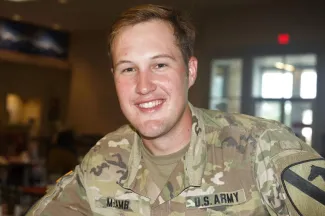Grantee Story
Veterans Pursue a Life of Purpose
with The COMMIT Foundation
Published Oct 16, 2023
About 200,000 service members leave the military each year. While many of these veterans have highly developed skills, finding a professional fit for their experience can be a challenging journey even for those who achieved a higher rank or served in elite units. Navigating the transition from the military requires translating professional skills, making new contacts, and understanding which career path will lead to personal fulfillment.
The COMMIT Foundation works with veterans transitioning to civilian life to identify their interests, build networks to expose them to opportunities and begin a career path that will fulfill them professionally and personally.
A core focus of the Clark Foundation is supporting veterans in finding their sense of purpose and contributing to their communities, building on Mr. Clark’s commitment to honoring those who served our country and investing in strong leadership. Since 2018, the Clark Foundation has invested about $7 million in COMMIT, enabling the organization to grow rapidly and create an array of programs that are unique and well-known within the veterans’ community.
COMMIT pairs veterans with mentors to coach them through exploring their passions, identifying their core values, and building a network of contacts. They also offer workshops focused on transferring military experience to civilian professional life, conducted by professional executive coaches and successfully transitioned leaders from various industries.
“The biggest difference between someone the day they begin with COMMIT and the day that they fully transition and they start their job, is what we call ICI: Information, confidence and imagination. We give them the information and the confidence to imagine a fulfilling and flourishing post-service life,” said COMMIT CEO Alex Krongard, a retired 1-star Admiral and former Navy SEAL.
Addison McLamb found the information and the confidence that led him to his current position as deputy to the Chief Marketing Officer of Carta, a financial technology firm in Menlo Park, California.
“Very directly, the role that I have now was through someone that I reached out to because of a shared COMMIT connection,” said McLamb, who added that his COMMIT journey taught him the importance of networking. “COMMIT has this idea they talk about called a thousand cups of coffee, which is having meetings as much as possible with people just to learn. And so doing that over a course of time, over and over again, I think that’s how I found success and I think that’s how a lot of other people found success.”
McLamb left the military in March 2022 after serving for five years as an intelligence officer in the Army. When he began to think about transitioning to civilian life, several veterans referred him to COMMIT.
Both McLamb and Krongard discussed the challenges of transitioning from the military’s structure and clear linear career progression to a wide-open world of professional opportunities. Civilian careers offer more choice and options than the military but also require more self-reliance to successfully explore and navigate.

Addison McLamb served for 5 years as an intelligence officer in the Army before transitioning to the private sector.
“How do you take an exceptional service member and really accelerate them into the workplace, and give them the greatest possible chance of success?” Krongard asked. While some veterans know the field they want to enter, others need exposure to the possibilities that exist. “There are other people who have no idea what they want to do. They talk to the Director of Veteran Services. They talk to a coach. They go to a workshop. They get specialized assistance with resume writing and interviews and salary negotiation. And then we find them a mentor in the industry or industries, plural, that they’re interested in. They talk with the mentor or mentors and figure out what they want to do,” Krongard said.
COMMIT empowers veterans to expand their horizons by examining the nexus where their skills, values and interests all meet. “The biggest difference now is, I don’t know what’s next. Am I enjoying it? What do I want in a career? How do I grow in that? These are questions I never got to ask in the military. It’s not laid out in black and white,” McLamb said.
The Clark Foundation’s investment in COMMIT has enabled the organization to work with more than 4,000 veterans to date, with plans to expand its reach to 2,200 veterans annually. “It is not even remotely an exaggeration to say that we wouldn’t be who we are today without the Clark Foundation. Period. And it’s more than just the financial dimension,” Krongard said, adding that Clark encourages collaboration among veterans’ groups and brings a level of attention to its partnership with COMMIT that pushes the organization to evaluate its processes, goals and results. “It’s what we would call a force multiplier in the military. It’s more than the sum of its parts,” said Krongard of the Clark Foundation’s partnership.
COMMIT launched McLamb into his new career, where he finds himself challenged and content. He’s grateful for the guidance the organization gave him and is open to mentoring future veterans seeking to transition to the private sector. “I definitely want to give back in some way, whatever that looks like. Leaving the military was a really tough, stressful time for me, having to work through what the next steps were,” McLamb said. “And so, to the extent that I can help make that less stressful for someone else like me in the future, then I’m all for it.”